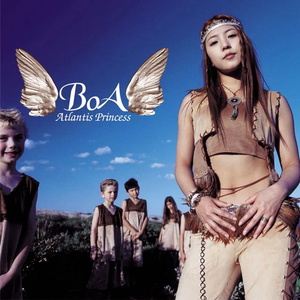Published on Jul 14, 2003
BoA made international headlines as a Korean pop artist who sold
millions in Japan. She is, basically, a Korean artist signed to a
Korean label that has distributors in Japan, who in turn marketed
her Korean songs in the Japanese language (at karaokes everywhere
you can get “Valenti” lyrics in both Korean and Japanese). BoA was
from the beginning groomed for stardom, a manufactured pop artist
so professionally crafted that even those who oppose manufactured
pop music on principle couldn’t resist her grooves. Think Westlife,
with whom BoA has dueted.
Atlantis Princess is BoA’s latest collection of original
Korean-language material (which hasn’t stopped the first single
from going number one in Taiwan). It is more or less predictable,
and more or less what the people want: a shiny glamorous world with
bright-voweled lyrics and an industrial beat. The album is, for
better or worse, replete with Western pop influences ranging from
American urban to Swede pop.
The title track best represents this BoA sound, as well as the
starlit dance track “Milky Way” and “The Lights of Seoul” (there is
a bonus track of “The Lights of Seoul” sung in English; BoA’s
diction is, as ever, incomprehensible). “Beat of an Angel” (if it’s
chunsa-eui soomgyul shouldn’t it be “BREATH of an Angel”?) combines
major and minor chords for that Max Martin/Britney Spears
“Stronger” feel.
There are some Dallas Austin-like mid-tempo tracks (R&B
singing on hip-hop background) such as “Time to Begin,” a track
that sounds suspiciously similar to Toni Braxton’s “Hit the
Freeway.” Most of the unmemorable filler songs are written to this
dynamic, making it clear that seventeen year-old BoA has neither
the artistic maturity nor pure attitude to pull them off. These
should’ve been reserved for, say, the fifth album.
Conventional ballads are not BoA’s strongpoint, especially in a
market where “ballad” is considered a genre in itself. She has the
marketing to pull off Brandy-style mid-tempo ballads like “The Show
Must Go On” but most are simply easy-to-sing throwaway melodies
such as “Where Are You” and “Tree” (the latter amazingly released
as a single). I know this is Korea but why feel obligated to sing
ballads? Just do what you’re good at doing, or at least get a
decent lyricist.
But perhaps BoA’s significance is not about her music but the
cross-cultural nature of her sales, this despite her Korean-ness.
For this alone I applaud BoA and her team’s success in Asia. World
peace does not begin or end with international conferences but
sharing mundane cultural artifacts such as pop music or subtitled
television soaps, and for this fiercely divided continent, more
people than one may think are silently rooting for this lone
seventeen year-old dancing her heart out on stage. The music itself
has a way to go, but BoA – perhaps unintentionally – already
carries on her shoulders a kind of hope that’s rarely reserved for
pop stars or entertainers of any kind. Here’s to not world
domination, but visibility and appreciation.
